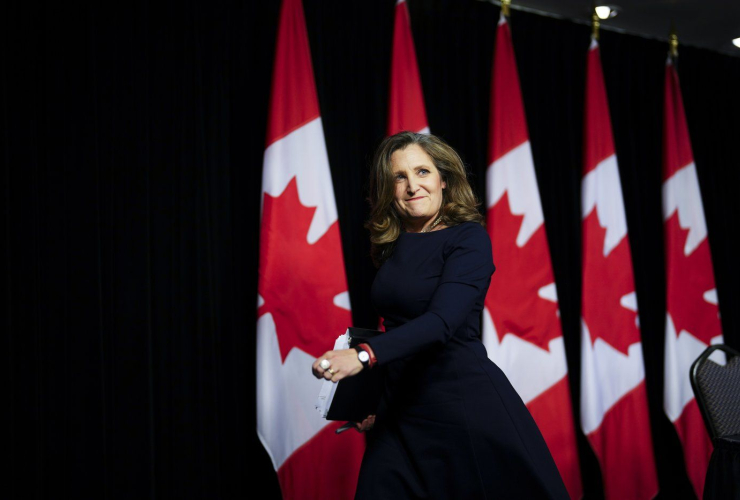Finance Minister Chrystia Freeland on Tuesday unveiled a federal budget that keeps the deficit limited to $40 billion, thanks to higher-than-expected government revenues and new taxes that largely offset billions in new spending.
Freeland introduced the federal budget in the House of Commons in the afternoon, which promises $53 billion in new spending that she said focuses on economic justice for younger generations.
“We are moving forward to help build more homes, faster. We are making life cost less. We are driving the kind of economic growth that will ensure every generation of Canadians can reach their full potential,” Freeland said in her remarks. opening ceremony in the House of Commons.
The Liberal government plans to pay for most of its new spending initiatives with higher taxes on the wealthiest Canadians and businesses, and with higher-than-expected government revenue.
The budget proposes to increase the capital gains inclusion rate, which refers to the taxable portion of profits made from the sale of assets.
The taxable portion of capital gains over $250,000 would increase from half to two-thirds, which the federal government says will only affect 0.1 per cent of Canadians and raise nearly $20 billion in income over five years.
All capital gains earned by corporations and trusts will face the two-thirds inclusion rate.
“I know there will be many voices of protest. No one likes paying more taxes, not even – or perhaps particularly – those who can most afford it,” Freeland said.
“But before you complain too bitterly, I’d like the one per cent of Canada – the 0.1 per cent of Canada – to consider this: What kind of Canada do they want to live in?”
The Liberals raise the capital gains tax on the wealthiest Canadians to pay for their agenda. #CDNPoli #Budget2024 #CapitalGains #Economy
Dan Kelly, president of the Canadian Federation of Independent Business, said an early assessment of the capital gains tax changes will improve the situation for most small businesses.
That’s because the government increased the lifetime capital gains exemption from about $1 million to $1.25 million, meaning Canadians can exempt capital gains up to that amount on the sale of small business shares and agricultural and fishing properties.
The government is also proposing the Canadian Entrepreneur Incentive, which will reduce the inclusion rate to one-third on a lifetime maximum of $2 million in eligible capital gains.
“But increasing the capital gains inclusion rate to 66.7 percent will create many net losers, including midsize business owners,” Kelly said in a statement.
The Liberal government points out that in other countries, including the United States, companies have to pay corporate taxes on all capital gains.
James Orlando, TD’s economics director, said federal spending is accelerating but remains below the government’s self-imposed “speed limit.”
“We are seeing a deficit profile that is going to be broader than what we saw just a few months ago. And that means there will be greater spending, a greater debt burden,” Orlando said in an interview.
“But due to the fact that common growth has improved, the government is still under its fiscal anchors.”
In the run-up to the budget, Freeland pledged that the government would deliver on the fiscal barriers it promised in the fall, including preventing the deficit from exceeding $40.1 billion.
The autumn economic statement also set a target of keeping deficits below one per cent of GDP from 2026-27 and reducing the debt-to-GDP ratio in 2024-25 relative to projection.
While the deficit for fiscal year 2023-24 remained stable at $40 billion, it was larger than previously projected for the remainder of the projection horizon.
Still, the deficit, deficit-to-GDP ratio and debt-to-GDP ratio are projected to fall each year until 2028-29.
Federal finances are also benefiting from a stronger economy and higher-than-expected income tax revenues, which also helped the government pay for new measures without breaching promised fiscal barriers.
Ottawa’s spending plan coincided with the latest consumer price index report.
Canada’s annual inflation rate rose to 2.9 per cent in March, while core inflation measures cooled, bolstering the possibility of a June rate for the Bank of Canada.
Gov. Tiff Macklem applauded the federal government’s new fiscal anchors unveiled in the fall and has called for fiscal policy to move in the same direction as monetary policy.
But Orlando said rising deficits don’t make the central bank’s task of fighting inflation any easier.
“I would say that… having larger deficits is inflationary for Canada. And therefore it doesn’t help the Bank of Canada in any way with respect to reducing inflation,” he said.
The federal deficit is projected to be $39.8 billion for fiscal year 2024-25, which is above the fall projection of $38.4 billion.
While much of the federal budget focused on affordability and housing, the Liberals also allocated some money to initiatives aimed at boosting the economy’s productivity.
That includes billions to expand the country’s artificial intelligence capacity and boost research support.
Orlando said whether these measures help stimulate greater productivity through technological development will not be known for a few years.
“At the same time, it’s very easy to argue that additional taxes discourage investment in this country, and what we need in this country is more investment.”
This report by The Canadian Press was first published April 16, 2024.

